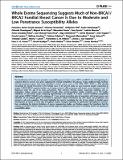Por favor, use este identificador para citar o enlazar a este item:
http://hdl.handle.net/10261/116708COMPARTIR / EXPORTAR:
 SHARE SHARE
 CORE
BASE CORE
BASE
|
|
| Visualizar otros formatos: MARC | Dublin Core | RDF | ORE | MODS | METS | DIDL | DATACITE | |

| Título: | Whole exome sequencing suggests much of non-BRCA1/BRCA2 familial breast cancer is due to moderate and low penetrance susceptibility alleles |
Autor: | Gracia-Aznarez, Francisco Javier; Hoya, Miguel de la; Durán, Mercedes CSIC ORCID; Osorio, Ana; Benitez, Javier | Director: | Cancer Council NSW (Australia) | Fecha de publicación: | 2013 | Editor: | Public Library of Science | Citación: | PLoS ONE 8(2): e55681 (2013) | Resumen: | The identification of the two most prevalent susceptibility genes in breast cancer, BRCA1 and BRCA2, was the beginning of a sustained effort to uncover new genes explaining the missing heritability in this disease. Today, additional high, moderate and low penetrance genes have been identified in breast cancer, such as P53, PTEN, STK11, PALB2 or ATM, globally accounting for around 35 percent of the familial cases. In the present study we used massively parallel sequencing to analyze 7 BRCA1/BRCA2 negative families, each having at least 6 affected women with breast cancer (between 6 and 10) diagnosed under the age of 60 across generations. After extensive filtering, Sanger sequencing validation and co-segregation studies, variants were prioritized through either control-population studies, including up to 750 healthy individuals, or case-control assays comprising approximately 5300 samples. As a result, a known moderate susceptibility indel variant (CHEK2 1100delC) and a catalogue of 11 rare variants presenting signs of association with breast cancer were identified. All the affected genes are involved in important cellular mechanisms like DNA repair, cell proliferation and survival or cell cycle regulation. This study highlights the need to investigate the role of rare variants in familial cancer development by means of novel high throughput analysis strategies optimized for genetically heterogeneous scenarios. Even considering the intrinsic limitations of exome resequencing studies, our findings support the hypothesis that the majority of non-BRCA1/BRCA2 breast cancer families might be explained by the action of moderate and/or low penetrance susceptibility alleles. © 2013 Gracia-Aznarez et al. | Descripción: | This is an open-access article distributed under the terms of the Creative Commons Attribution License.-- et al. | Versión del editor: | http://dx.doi.org/10.1371/journal.pone.0055681 | URI: | http://hdl.handle.net/10261/116708 | DOI: | 10.1371/journal.pone.0055681 | Identificadores: | doi: 10.1371/journal.pone.0055681 issn: 1932-6203 |
| Aparece en las colecciones: | (IBGM) Artículos |
Ficheros en este ítem:
| Fichero | Descripción | Tamaño | Formato | |
|---|---|---|---|---|
| BRCA2 Familial Breast.pdf | 222,09 kB | Adobe PDF |  Visualizar/Abrir |
CORE Recommender
PubMed Central
Citations
49
checked on 28-abr-2024
SCOPUSTM
Citations
83
checked on 28-abr-2024
WEB OF SCIENCETM
Citations
78
checked on 26-feb-2024
Page view(s)
323
checked on 03-may-2024
Download(s)
244
checked on 03-may-2024

